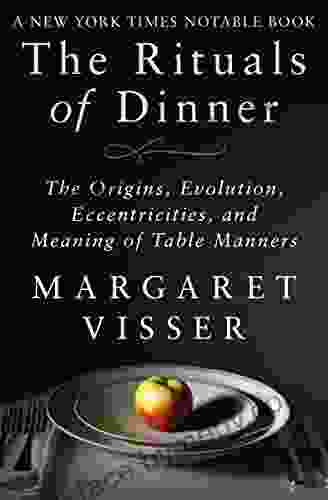The Rituals of Dinner: Exploring the Cultural, Social, and Culinary Significance of the Evening Meal

Dinner is more than just a meal. It is a ritual that has been passed down through generations, a time for family and friends to come together and share food and conversation. The rituals of dinner vary from culture to culture, but they all serve the same purpose: to create a sense of community and belonging.
4 out of 5
| Language | : | English |
| File size | : | 1694 KB |
| Text-to-Speech | : | Enabled |
| Enhanced typesetting | : | Enabled |
| X-Ray for textbooks | : | Enabled |
| Word Wise | : | Enabled |
| Print length | : | 450 pages |
| Lending | : | Enabled |
| X-Ray | : | Enabled |
| Screen Reader | : | Supported |
In some cultures, dinner is a formal affair, with set courses and strict rules of etiquette. In other cultures, it is a more casual meal, where people can relax and enjoy each other's company. No matter what the format, dinner is an important part of the social fabric of every culture.
The act of cooking dinner can also be a ritual in itself. In many cultures, the preparation of food is seen as a way to show love and care for others. When we cook for someone, we are not only providing them with nourishment, but we are also expressing our love and affection.
The rituals of dinner are not just about the food. They are about the people who share the meal and the connections that are formed around the table. Dinner is a time to connect with our loved ones, to share stories, and to laugh. It is a time to slow down and appreciate the simple things in life.
In a world that is increasingly fast-paced and impersonal, the rituals of dinner are more important than ever. They provide us with a sense of community and belonging, and they help us to connect with our loved ones. So next time you sit down to dinner, take a moment to appreciate the ritual that you are participating in. And remember, the most important ingredient in any meal is love.
The History of Dinner
The history of dinner can be traced back to the earliest days of human civilization. The first humans were hunter-gatherers, and they would often share their food around a fire at the end of the day. As humans began to settle down and form communities, the evening meal became more formalized.
In ancient Greece, dinner was a central part of the day. The Greeks believed that a good meal was essential for good health and happiness. They would often spend hours preparing their meals, and they would dine on a variety of dishes, including meat, fish, vegetables, and fruit.
The Romans also placed great importance on dinner. They would often hold elaborate banquets, which would last for hours. These banquets were a way for the Romans to show off their wealth and status. They would often serve exotic dishes, such as peacock tongue and nightingale pie.
In the Middle Ages, dinner was a more modest affair. People would typically eat simple meals, such as bread, cheese, and soup. However, on special occasions, they would feast on more elaborate dishes, such as roast goose and venison.
The Renaissance saw a renewed interest in food and dining. The wealthy would often hire chefs to prepare elaborate meals for them. These meals would often feature multiple courses, and they would be served on fine china and silverware.
In the 18th century, dinner became more formal. The upper classes would often dine on four or five courses, and they would follow strict rules of etiquette. The middle classes would also dine on multiple courses, but their meals were more modest. The poor would typically eat simple meals, such as bread, potatoes, and vegetables.
In the 19th century, dinner became less formal. The middle classes began to adopt the dining habits of the upper classes, and the poor began to eat more meat and other processed foods. By the 20th century, dinner had become a more casual meal. People would often eat out at restaurants, or they would prepare simple meals at home.
The Rituals of Dinner Around the World
The rituals of dinner vary from culture to culture. In some cultures, dinner is a formal affair, with set courses and strict rules of etiquette. In other cultures, it is a more casual meal, where people can relax and enjoy each other's company.
In China, dinner is typically a multi-course meal. The first course is usually a soup, followed by a variety of dishes, such as rice, noodles, vegetables, and meat. The meal is often served with tea or wine.
In Japan, dinner is typically a simple meal. The most common dishes are rice, miso soup, and grilled fish. Dinner is often served with a side of pickles or other vegetables.
In Italy, dinner is a leisurely affair. The meal typically begins with an appetizer, followed by a pasta course and a meat course. The meal is often finished with a dessert, such as gelato or tiramisu.
In France, dinner is a formal affair. The meal typically consists of three or four courses, and it is often served with wine. The most common dishes are steak, fish, and cheese.
No matter what the culture, dinner is an important part of the social fabric. It is a time for family and friends to come together and share food and conversation. The rituals of dinner help to create a sense of community and belonging.
The Importance of Dinner
Dinner is more than just a meal. It is a ritual that has been passed down through generations, a time for family and friends to come together and share food and conversation. The rituals of dinner vary from culture to culture, but they all serve the same purpose: to create a sense of community and belonging.
In a world that is increasingly fast-paced and impersonal, the rituals of dinner are more important than ever. They provide us with a sense of community and belonging, and they help us to connect with our loved ones. So next time you sit down to dinner, take a moment to appreciate the ritual that you are participating in. And remember, the most important ingredient in any meal is love.
The Rituals of Dinner is a comprehensive exploration of the cultural, social, and culinary significance of the evening meal. From the earliest communal gatherings around a fire to the elaborate banquets of kings and queens, dinner has played a central role in human history. This book delves into the rituals, traditions, and customs that have shaped the evening meal, and explores how they have evolved over time.
The Rituals of Dinner is a must-read for anyone who is interested in the history of food, culture, or society. It is a fascinating and informative book that will provide you with a new appreciation for the importance of dinner.
4 out of 5
| Language | : | English |
| File size | : | 1694 KB |
| Text-to-Speech | : | Enabled |
| Enhanced typesetting | : | Enabled |
| X-Ray for textbooks | : | Enabled |
| Word Wise | : | Enabled |
| Print length | : | 450 pages |
| Lending | : | Enabled |
| X-Ray | : | Enabled |
| Screen Reader | : | Supported |
Do you want to contribute by writing guest posts on this blog?
Please contact us and send us a resume of previous articles that you have written.
 Book
Book Novel
Novel Page
Page Chapter
Chapter Text
Text Story
Story Genre
Genre Reader
Reader Library
Library Paperback
Paperback E-book
E-book Magazine
Magazine Newspaper
Newspaper Paragraph
Paragraph Sentence
Sentence Bookmark
Bookmark Shelf
Shelf Glossary
Glossary Bibliography
Bibliography Foreword
Foreword Preface
Preface Synopsis
Synopsis Annotation
Annotation Footnote
Footnote Manuscript
Manuscript Scroll
Scroll Codex
Codex Tome
Tome Bestseller
Bestseller Classics
Classics Library card
Library card Narrative
Narrative Biography
Biography Autobiography
Autobiography Memoir
Memoir Reference
Reference Encyclopedia
Encyclopedia Peter Hanson
Peter Hanson Steven R Weisman
Steven R Weisman Elizabeth S Trafalgar
Elizabeth S Trafalgar Kaleena Amuchastegui
Kaleena Amuchastegui Ellen Marie Wiseman
Ellen Marie Wiseman Emily J Taylor
Emily J Taylor Ruth Wilshaw
Ruth Wilshaw George Buehler
George Buehler H B Cavalcanti
H B Cavalcanti Elizabeth Acevedo
Elizabeth Acevedo Emily Lowry
Emily Lowry John P Kotter
John P Kotter Emeril Lagasse
Emeril Lagasse Susan Williams White
Susan Williams White Emily Parke Chase
Emily Parke Chase Eric Alperin
Eric Alperin Lesley Bown
Lesley Bown Sanjay Gupta
Sanjay Gupta Elisabeth Wolf
Elisabeth Wolf Emily Colson
Emily Colson
Light bulbAdvertise smarter! Our strategic ad space ensures maximum exposure. Reserve your spot today!

 Alexander BlairUnleash the Magic: Embark on the Thrilling Silver Batal Race for the Dragon...
Alexander BlairUnleash the Magic: Embark on the Thrilling Silver Batal Race for the Dragon...
 Raymond ChandlerThe Ultimate Boutique Handbook: Your Blueprint for a Thriving Fashion Empire
Raymond ChandlerThe Ultimate Boutique Handbook: Your Blueprint for a Thriving Fashion Empire
 Jace MitchellUnraveling the Tapestry of Costume Design: A Journey through The Complete...
Jace MitchellUnraveling the Tapestry of Costume Design: A Journey through The Complete... Emanuel BellFollow ·9.5k
Emanuel BellFollow ·9.5k Edward BellFollow ·12k
Edward BellFollow ·12k Cooper BellFollow ·14.1k
Cooper BellFollow ·14.1k Corbin PowellFollow ·12.9k
Corbin PowellFollow ·12.9k Francisco CoxFollow ·4.4k
Francisco CoxFollow ·4.4k Mikhail BulgakovFollow ·8.7k
Mikhail BulgakovFollow ·8.7k Haruki MurakamiFollow ·11k
Haruki MurakamiFollow ·11k Clark CampbellFollow ·4.5k
Clark CampbellFollow ·4.5k

 Richard Adams
Richard AdamsGame Development with Rust and WebAssembly: A...
Are you passionate...

 David Baldacci
David BaldacciGendered Identity and Aspiration on the Globalized Shop...
: The Convergence of Gender, Identity, and...

 Natsume Sōseki
Natsume SōsekiFresh Eyes On Panama: A Captivating Exploration of a...
Panama, a country often overshadowed by its...

 Adrian Ward
Adrian WardThe Life and Masterworks of J.M.W. Turner: A Timeless...
The Man Behind the Masterpieces ...
4 out of 5
| Language | : | English |
| File size | : | 1694 KB |
| Text-to-Speech | : | Enabled |
| Enhanced typesetting | : | Enabled |
| X-Ray for textbooks | : | Enabled |
| Word Wise | : | Enabled |
| Print length | : | 450 pages |
| Lending | : | Enabled |
| X-Ray | : | Enabled |
| Screen Reader | : | Supported |










